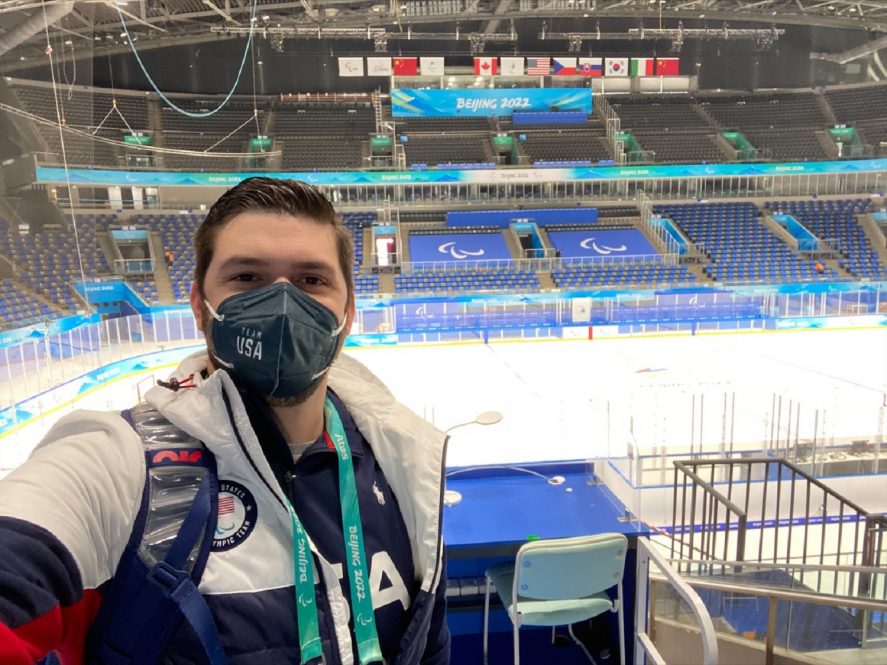When Kyle Huson ’16 (CLAS) played competitive ice hockey, he’d lug his heavy gear to the rink. Now, he carries a laptop, and for the next week and a half credentials and a passport, as he covers the U.S. Paralympic Sled Hockey Team at the Paralympic Games in Beijing.
Huson, who majored in journalism and communication, is digital content manager at USA Hockey in Colorado Springs, Colorado, writing stories, posting content, and managing its social media channels. During the Winter Olympics, which closed Feb. 20, he stayed state-side and received content from staffers who were at the Games. But during the Paralympics, March 4-13, he’ll witness the action in China firsthand and provide his own accounts.
“A lot of what I do I owe to what I learned at UConn and the journalism and communication departments,” Huson says. “What I do is not just journalism-specific in terms of writing stories, but it’s also photography and videography. I’m able to provide in-depth content from different competitions and tournaments because of what I learned in my classes at UConn.”
These are the first Olympics and Paralympics for Huson, who joined USA Hockey in 2019, a year after the women’s Olympic team and the Paralympic sled hockey team each beat Canada to win gold medals.
While the women’s team earned silver in Beijing, the Paralympic team is set for a rematch against Canada to start its schedule on March 5 at 12:05 a.m. Eastern time. The gold medal game for whichever countries advance will be March 13, a day after the bronze medal game March 12.
During the Olympics, Huson says he oftentimes would have to get into the office at 4:30 a.m. for a 6 a.m. puck drop, thanks to the time difference in China, so he could live-post the game on social media.
“We’re watching the game happen live at 9 p.m. over there, covering it live here in the wee hours, and providing people with some of the access they might not normally get, especially at that hour,” he says. “There’s been some late nights, followed by early mornings, and not a lot of sleep. But it’s totally worth it to be able to watch and cover these top-level athletes.”
At the Paralympics, his work schedule will be reversed when he’s watching the games play out before his eyes.
“I feel incredibly lucky, incredibly blessed to be a part of the Olympics and Paralympics and be afforded the opportunity to go over there, because there aren’t a lot of people who’ve had the opportunity,” he says. “On top of that, my wife works for the U.S. Olympic and Paralympic Committee in a very similar field. She’ll be in Beijing at the same time I am. To be able to experience the Games and work with her is going to be something that’s very special to us.”
Kyle and Emily Huson are no strangers to travel.
She worked at the Paralympics in Tokyo during the Summer Olympics, and he staffs a handful of international competitions throughout the year, including the International Ice Hockey Federation men’s and women’s world championships, world junior championship, U-18 men’s and women’s championships, and the International Paralympic Committee sled hockey world championship.
“It’s remarkable what they’re able to do on those sleds,” Huson says of the Paralympic team. “Each sled is formed to the athlete based on their disability. For example, some of our sled team members are single or double amputees, some near the hip or mid-way on the leg at the femur. All of that makes the sled a little bit different.”
At some promotional events, NHL players have gotten into a more generalized-fitting sled, and they’ve struggled to get their bearings on the ice, he says.
“It just gives you a really good perspective of how difficult and how amazing these athletes are to be able to use those sleds and be able to move just effortlessly, with the two thin blades on the bottom and they’re carving the ice. It’s just incredible what they do,” he says.
As for his own hockey pursuits, after playing at UConn from 2012-16, Huson says he now puts on his skates only for staff hockey games at lunch on Tuesdays.
“As soon as I stopped playing, I missed it,” he says, “but I knew it was the right time for me to stop playing competitively. It always feels good to get back on the ice, if nothing else for a good workout. But the one thing we like to say at USA Hockey is hockey is for life.”



